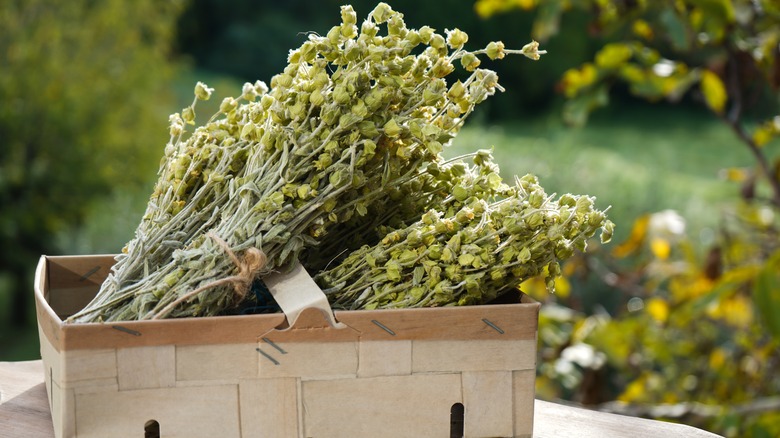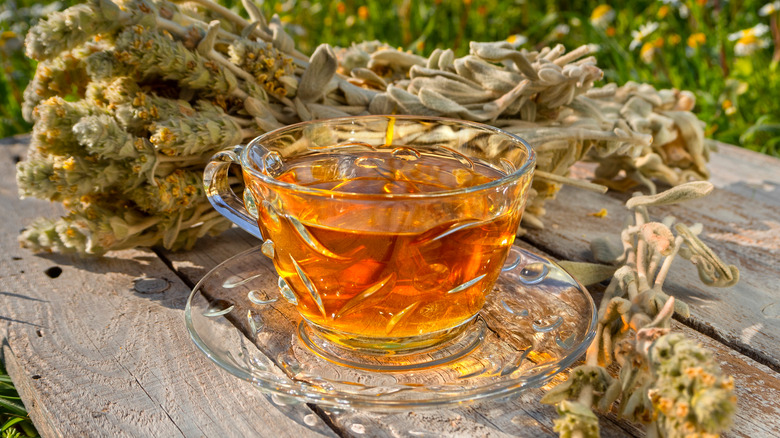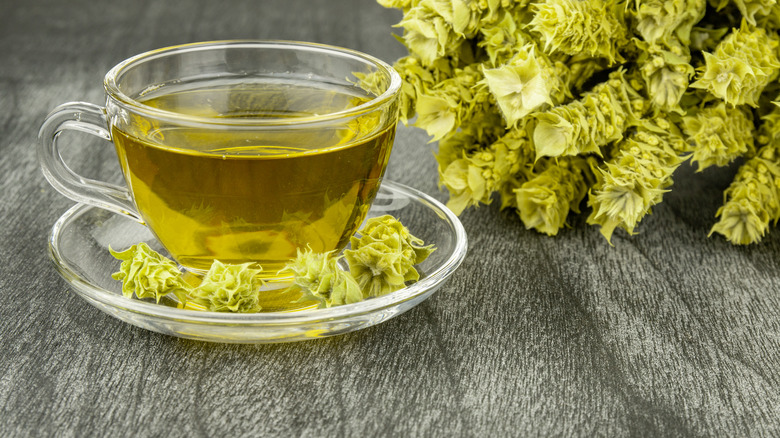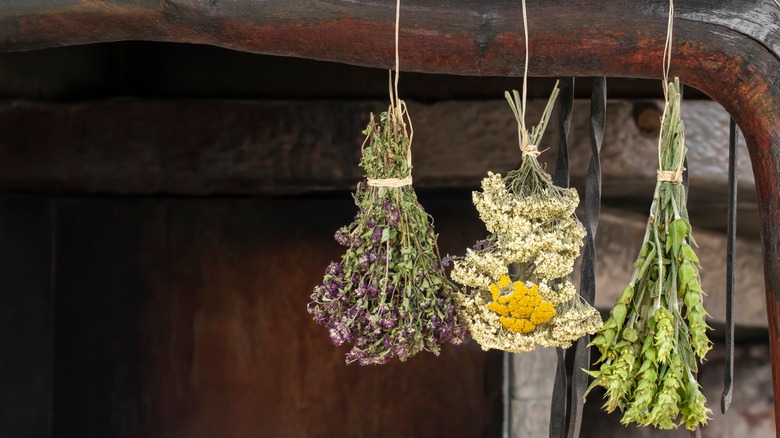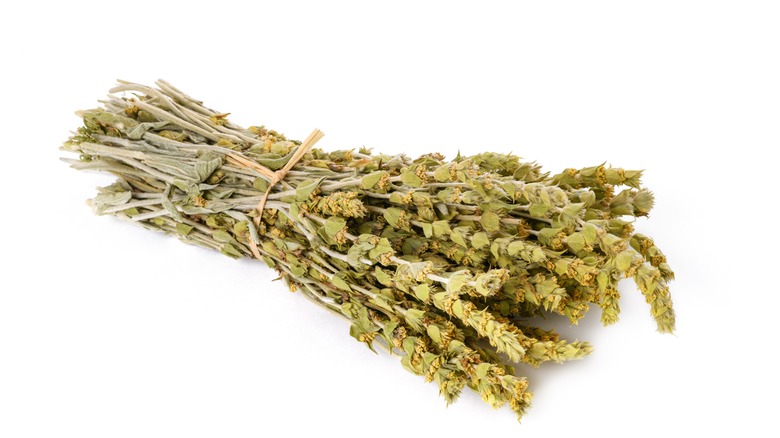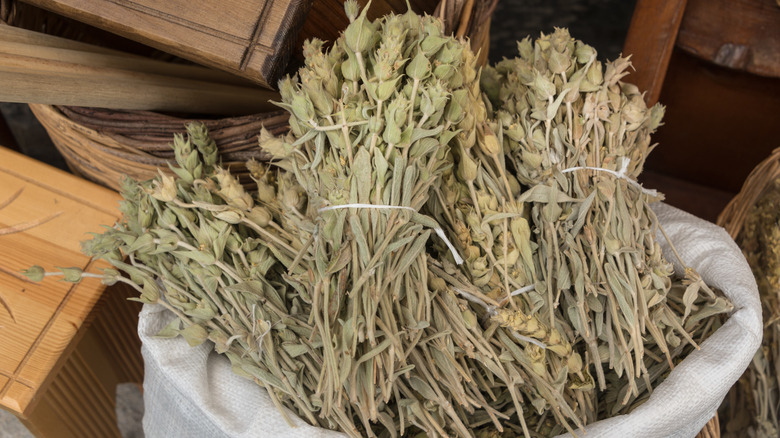What Makes Greek Mountain Tea Unique?
There's nothing quite like a soothing mug of tea — and there are many options to choose from. By some estimates, over 20,000 varieties of tea exist. And while caffeinating options like green or black are popular for a good reason — the former has many health benefits — herbal teas can be a soothing alternative. Such a categorization expands to more options and can include any plant, flower, spice, or fruit steeped in hot water.
Across the Mediterranean, the Sideritis plant makes for a particularly notable herbal tea. Having been consumed for thousands of years, it has long been esteemed for its medicinal qualities. Known by many regional names, the plant is prevalent in Greece — hence why it's commonly referred to as Greek mountain tea in the U.S. Boasting both a delicious flavor and soothing quality, it's not hard to understand why the beverage is so popular. Let's dive into what makes Greek mountain tea so unique.
History of Sideritis
While most notably interlinked with Greece, the Sideritis herb is consumed all across the Mediterranean and Balkan regions. Historically regarded as herbal medicine, it's a noted beverage in Turkish tradition and has long been favored by Sicilian shepherds for its healing properties. Mountainous Bulgarians, especially from the Pirin range, have put the tea's alluring properties into print for over a century.
Regardless, it was from Ancient Greece that most lore arose. The plant's genus name Sideritis stems from the Greek word for iron since the herb was used as a treatment for sword wounds. Some believe this name was accredited by noted botanist Theophrastus, who lived from 372 to 287 BC. In addition to injuries, the mountain tea was also esteemed by Ancient Greek for its sore throat and cold-preventing properties. Its use has continued for centuries since — never quite fizzling out. Today, it's still prevalent in nearly every region in Greece, with many places boasting a unique name for the brew.
How Greek mountain tea is prepared
This earthy beverage is comprised of a single plant, typically prepared from a dried form. All components are utilized, including the leaves, stems, and dried flowers. A single serving of Greek mountain tea calls for two to three stems, which are placed in a pot alongside nine ounces of water. The mixture is brought to a boil and simmered for one to three minutes, depending on potency preference. Then, the heat is turned off, and the tea steeps for a minimum of two minutes. It's vital that the lid is kept on during the entire brewing process to minimize the evaporation of essential oils — the special component of the brew.
After steeping is complete, the tea is strained, poured into a mug, and enjoyed. It's commonly consumed cold, which is accomplished simply by refrigerating the resultant mixture. In Greece, it's also commonly brewed with a stick of cinnamon or as a component in blends alongside lavender and chamomile.
Greek mountain tea compared to other teas
Similar to rooibos and chamomile, Greek mountain tea is naturally caffeine free. It's not part of the Camellia sinensis family that encompasses popular varietals like green, black, and white tea. Instead, it's considered more broadly as an herbal beverage.
In fact, even the name Sideritis refers to a genus with a large variety of plants, encompassing over 160 species. Found in many forms and with different names, it's not only brewed but also used as a flavoring in both sweet and savory dishes. Such a definition means Greek mountain tea offers substantially more variability than other tea varietals.
Unlike products like matcha, which have distinct growth and processing methods, the Sideritis name represents a less defined product. Commonly used as an alternative medicine, Greek mountain tea is sometimes associated with health claims that are not always backed by scientific studies. Let's dive into the proven medicinal effects of Sideritis tea.
Health benefits of Greek mountain tea
Green tea contains polyphenol compounds noted for their antioxidant properties. These compounds boast a variety of health benefits, such as the potential to help prevent cancer, cardiovascular issues, and inflammation, according to a 2012 study published in the "Journal of Indian Society of Periodontology." Not all herbal teas possess such qualities. However, a 2013 study conducted by the University of Bologna showed that Greek mountain tea has similar compounds. While Sideritis contains fewer polyphenol compounds than other teas, the herbal beverage demonstrated similar antioxidant effects.
Greek mountain tea's disease-fighting qualities were also backed by a 2012 study published in an issue of the scientific journal "Molecules," which found various oil extracts from the plant offer protection against microbial infections like Strep and E.coli.
In addition to the tea's possible immune-boosting and antioxidant properties, research demonstrates veracity in its improvement of mental health, including easing depression, and with sleep apnea and other issues. However, there is a large variability in the origin and processing of the tea. Not all cups are equally potent, according to a 2018 study published in "Pain Research and Management," so the effects may vary.
Where Greek mountain tea is sold and consumed
While most strongly intertwined with the Mediterranean, the Sideritis herb grows in a region stretching from the Canary Islands to China. Of course, it's most popular in Greece, with even specific mountain ranges and islands boasting a unique species. However, it's also beloved in additional regions — a staple in rural Turkish cafes, long used by Sicilian shepherds, and widely cultivated across the Balkans.
Like with other teas, it's important to purchase from a reputable purveyor to fully enjoy Greek mountain tea. There is a multitude of sellers online, and the plant can also be found in Greek grocery stores as well as herb shops. Do check packaging dates before buying, as Greek mountain tea is most aromatic when fresh. And if you're fortunate enough to be located in a region where Sideritis grows naturally, head to a local market to find the freshest batch. Once procured, brew and enjoy — there are few teas that are as soothing.
